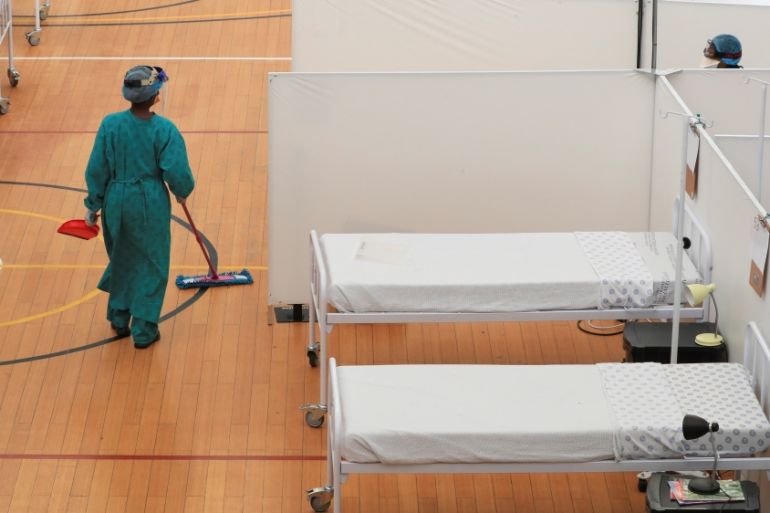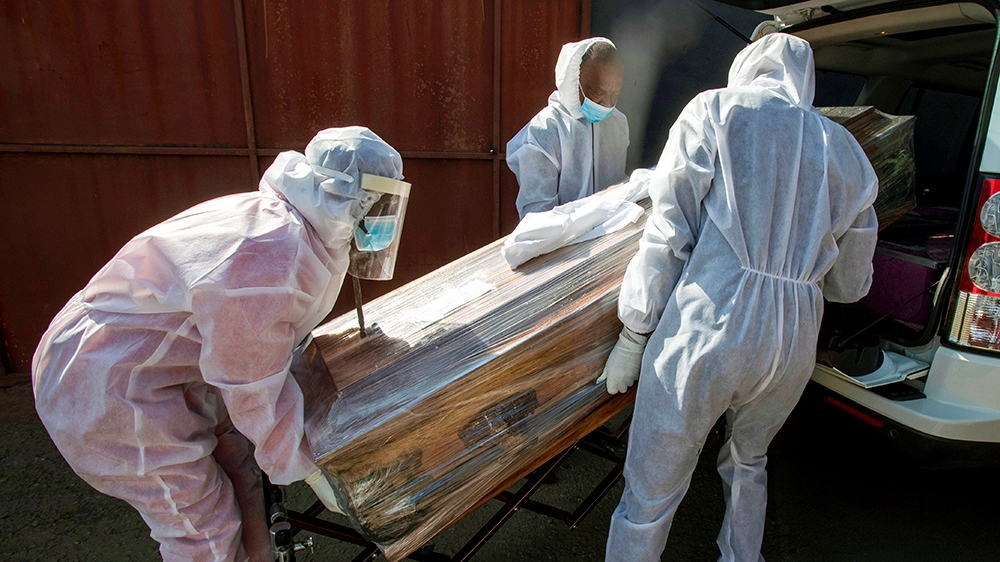‘No longer at a crossroads’: S Africa’s enduring COVID-19 battle
With fifth-highest coronavirus caseload globally, South Africa braces for peak-infection period amid graft allegations.

Johannesburg, South Africa – South Africa is grappling with a rapid surge in coronavirus infections that has overwhelmed hospitals and battered its economy.
The country imposed one of the world’s strictest lockdowns in March, but has seen COVID-19 infections jump following the gradual reopening in June of large parts of economic life.
Keep reading
list of 4 itemsMexico’s teachers seek relief from pandemic-era spike in school robberies
‘A bad chapter’: Tracing the origins of Ecuador’s rise in gang violence
Why is the US economy so resilient?
Last week, the government announced public schools would close again on Monday for a month, a period during which the country is expected to experience its sharpest spike in coronavirus transmissions.
The imminent arrival of South Africa’s peak-infection period coincides with allegations of widespread looting of funds earmarked for personal protective equipment – such as masks, gloves and medical visors – for medical workers, food parcels for poor South Africans, and benefits for those laid off as a result of the pandemic or chronically unemployed.
In a televised address to the nation last week, President Cyril Ramaphosa said promised swift action against anyone found guilty of corruption.
|
|
“At least 36 cases are currently at various stages of investigation and prosecution,” he said.
“The fight against the coronavirus pandemic is stretching our capabilities and resources to their limit. There should be no theft, no wastage and no mismanagement of public funds.”
Warning that “the coronavirus storm has indeed arrived”, Ramaphosa said “more so than at any other time, corruption puts our lives at risk.”
The president also said he had deployed a multi-pronged team from law enforcement to detect instances of corruption and ensure speedy prosecutions of all involved. He added that the justice department’s special investigating unit would update him on its progress in tracking down funds every six weeks.
But for some, these promises do not go far enough.
“Language of intent to say we are trying to deal with the problem by conducting forensic investigations doesn’t lead to accountability – that’s what is missing,” Melusi Ncala, researcher with the Corruption Watch local NGO, told Al Jazeera.
“Corruption is endemic and has been for some time in South Africa, and that didn’t change with the arrival of COVID-19,” he said.
Imminent COVID-19 peak
Still, South Africa has been lauded by the World Health Organization (WHO) for its efforts to curb the spread of COVID-19 through medical interventions, disease monitoring and movement restrictions that also saw alcohol and tobacco products banned from sale.
In April, the government deployed 28,000 healthcare workers and 67 mobile lab units to carry out tests and screening.
More than 2.7 million tests have so far been administered, and some 10 million people screened, with testing and screening significantly increasing as the country entered its winter season in June.
To date, South Africa has so far registered more than 445,000 confirmed COVID-19 cases, the top tally in Africa and the fifth-highest in the world – but the 6,769 related deaths represent a relatively low figure in comparison with other highly infected nations that are experiencing higher mortality rates.
“South Africa is not where it would want to be in terms of health service readiness, but this could have contributed to a lessening in the death rate the country has seen,” said Professor Helen Rees, of the WHO’s African Regional Immunization Technical Advisory Group. “In the end, it will always be a mixture of demographics, co-morbidities and how the health service has been able to respond.”
But the official number of fatalities may belie the extent of the outbreak.
The South African Medical Research Council (SAMRC) said last week that between early May to mid-July, there were at least 17,000 more deaths than usual in the country.
|
|
“By the second week of July, there were 59 percent more deaths from natural causes than would have been expected, based on historical data. It also means that reported deaths have shown a pattern that is completely different to those indicated by historical trends,” the SAMRC read.
Now, as the country enters its final month of winter, local health authorities and the WHO are warning that infections are going to spike.
“This is a nasty virus, and it is going to spread everywhere in South Africa,” Rees said.
Earlier this month, a nighttime curfew was reinstated, as was a ban on the sale and distribution of alcohol as part of measures to slow the outbreak and ease surging hospitalisations.
Ramaphosa said health officials were warning of impending shortages of hospital beds and oxygen, noting that some medical centres had had to turn away patients because they were full.
‘No longer at a crossroads’
Meanwhile, the government is also struggling to contain the economic fallout of the pandemic in a country struggling through a recession even before the arrival of coronavirus.
It has announced a $26bn economic relief package to support distressed companies and poor households that have been badly hit by the virus containment measures.
The initial stringent lockdown brought all industry to a grinding halt, with the South African Reserve Bank expecting Africa’s most developed economy to contract by 7.3 percent this year.
“We should all be very worried about the economy,” said Cas Coovadia, CEO of Business Unity South Africa, a confederation of business groups. “It is no longer a question about livelihoods being threatened as businesses are collapsing before our very eyes.”
A recent study found that up to three million people lost their jobs over the lockdown period – a disastrous prospect for a country that clocked 30.1 percent unemployment in the first quarter of 2020.
Ramaphosa has also promised structural changes to the South African economy in order to breathe life into a recovery plan that is centred on infrastructure development.
But this has been contested terrain as government, opposition parties, organised labour, and business argue over how the funds for any infrastructure projects should be secured.
“South Africa is no longer at a crossroads, we have now come to a clear fork in our economic journey,” Coovadia said. “We need urgent economic reforms if we are to ever enjoy a recovery now or in the future.”
